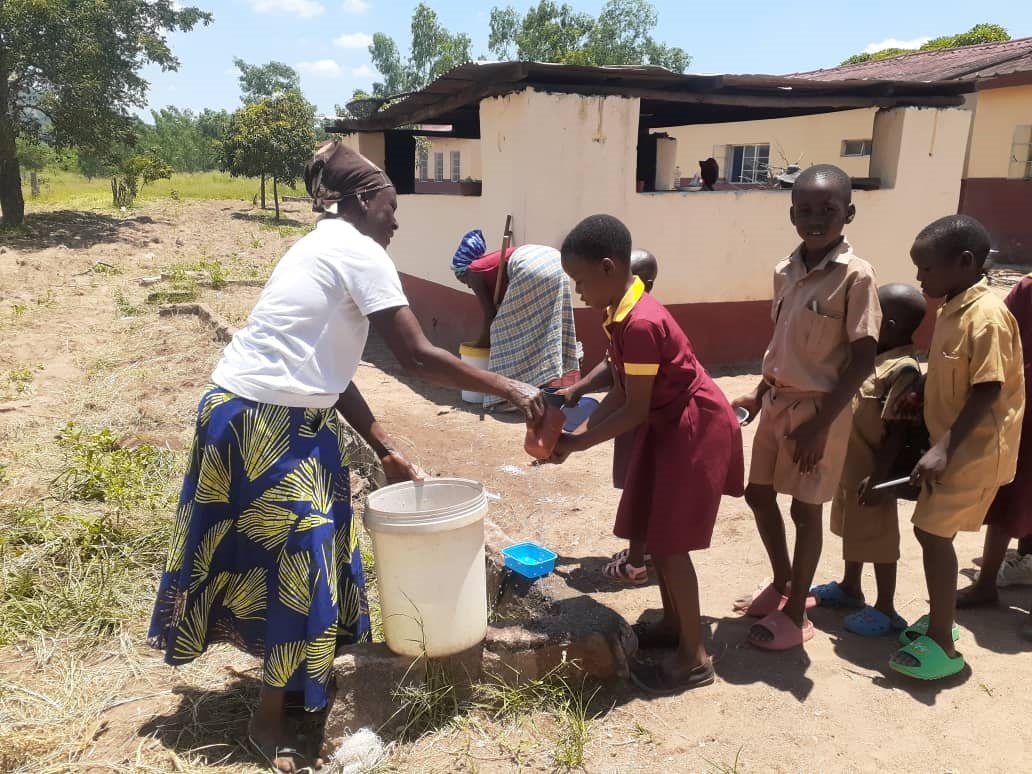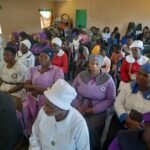By Beverly Bizeki
For Ashley Ronje, a grade 7 pupil at Charingeno Primary School one of the major developments she has witnessed at her school and can still remember is the availability of water as she no longer has to fetch water from a distance but is now able, together with other pupils, use hosepipes for watering trees in the orchard.
Situated in Zaka Central, Charingeno’s water situation was so dire that the school had to fetch water from a bush pump borehole sharing with people from the 16 villages surrounding the school which resulted in learners at the school running short of water to use time and again.
“The recent development that has taken place at our school is the availability of water through the piped water scheme. We can now get water from the tap and no longer have to fetch water using buckets from the borehole, we now use hosepipes to water the trees in our orchard,” said Ronje.
The school now has a functional piped water scheme using solar power which has made it possible to supply water around the school and the community around. This was made possible by the Ministry of Primary and Secondary Education (MoPSE) in collaboration with UNICEF and funding from the UK government implemented by Christian Care for improving schools in marginalized communities.
MoPSE Director of Communications Taungana Ndoro applauded the ongoing projects at the school saying it was important for learners to have these and would ensure that children from marginalized schools are not left behind.
“The government’s efforts in collaboration with development partners such as UNICEF are such that we leave no one and no place behind by ensuring that schools in remote areas like Charingeno here have access to WASH programmes which have made sure that the school is self-sufficient as they can now grow their food, have a vibrant orchard and fishpond.
“We urge all schools to implement such projects so that children in remote schools are not left behind to make up the dream school which we are campaigning for,” said Ndoro.
School head Mary Mukwenha said the water system had helped the school in starting projects like fish farming and fruit tree plantation.
“Before the piped water scheme we used to have a timetable for fetching water among teachers, the community, and the learners at the bush pump borehole. Scotch carts would line up to the gate to get water making it hard for pupils especially those in ECD to get access. UNICEF’s intervention saved the situation.
“Through the availability of water, we have started a fish farming project to boost the school’s income although we anticipate to supplement the children’s meals. We started our orchard in 2014 to supplement children’s meals and you can see that it is green all over, we have fruits all year round and the orchard is lively unlike before. We have two orchards and want to add a third one,” said an elated Mukwenha.
Deputy school head Nizwani Mazhara said although the water system had saved the school the school still needed more water preferably a unique source which they would not share with the communities.
“We used to irrigate our fields but have since stopped and we are now depending on rain-fed agriculture because the water is not enough. Sometimes we have to ration the water because the demand is high,” said Mazhara.
SDC Chairperson Mumbire Tombizana said the provision of water at the school had helped prevent disease outbreaks such as cholera as we haven’t had any cases at the school.
“The provision of water at the school has been helpful to us. Learners have access to clean drinking water. Last year but one we were affected by a cholera outbreak because of shortage of clean water but now we have access to drinkable water even our community,” said Mumbire.
One of the SDC members Juliana Tafirenyika said the situation was so dire such that learners could go without drinking water but it is a thing of the past now.
“Before the intervention by UNICEF, learners clashed with parents from the community to access water at the borehole and could fail to get drinking water from the borehole at times. However the situation has improved and the tapped water is coming in handy in the fight against cholera and for our school feeding program which relies on access to clean water,” said Tafirenyika.
The school however is still facing challenges with its ICT department as the school only has eight functional computers out of the 14 they have to serve their enrolment of 597 learners.
According to UNICEF, in Zimbabwe, access to safe water and sanitation is a major issue especially in rural areas.







